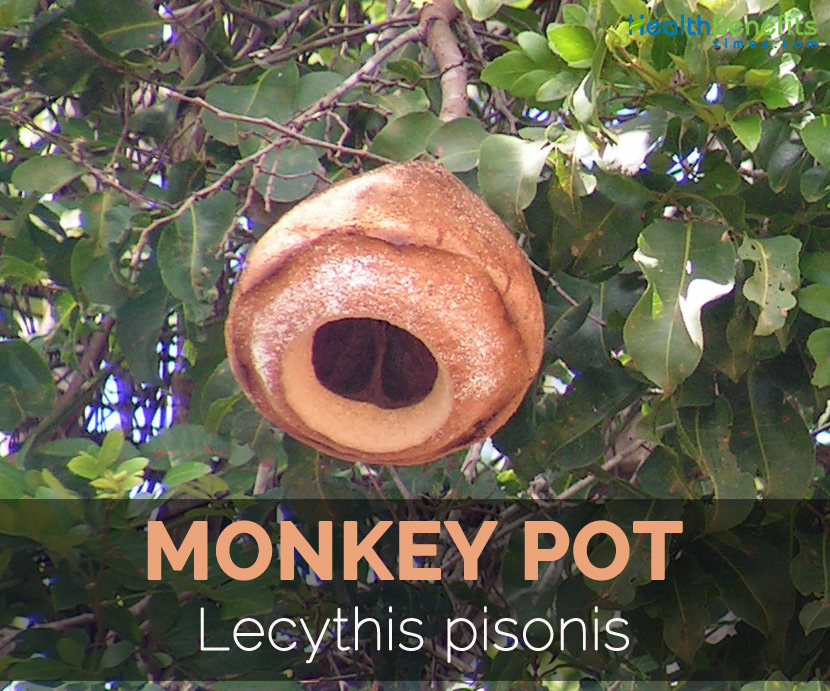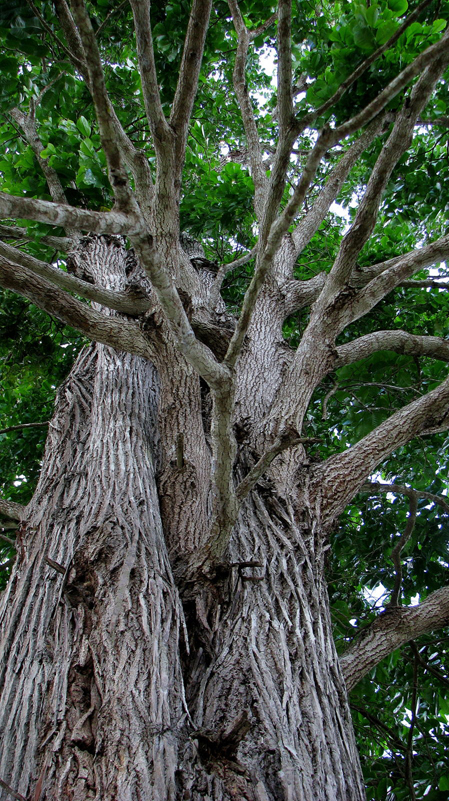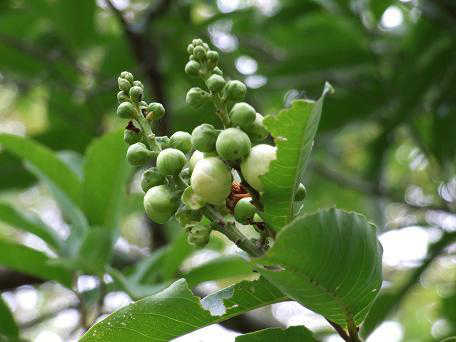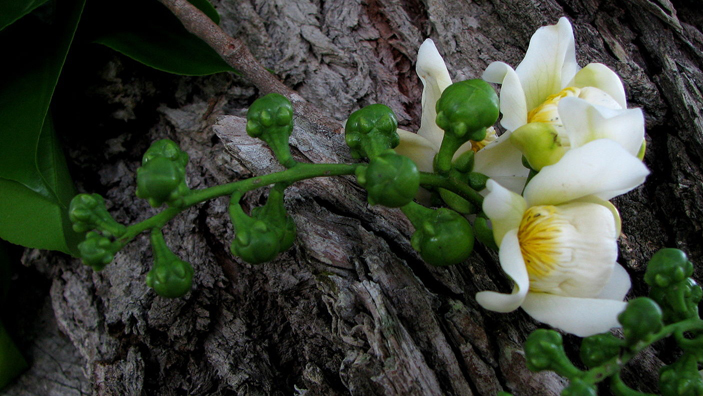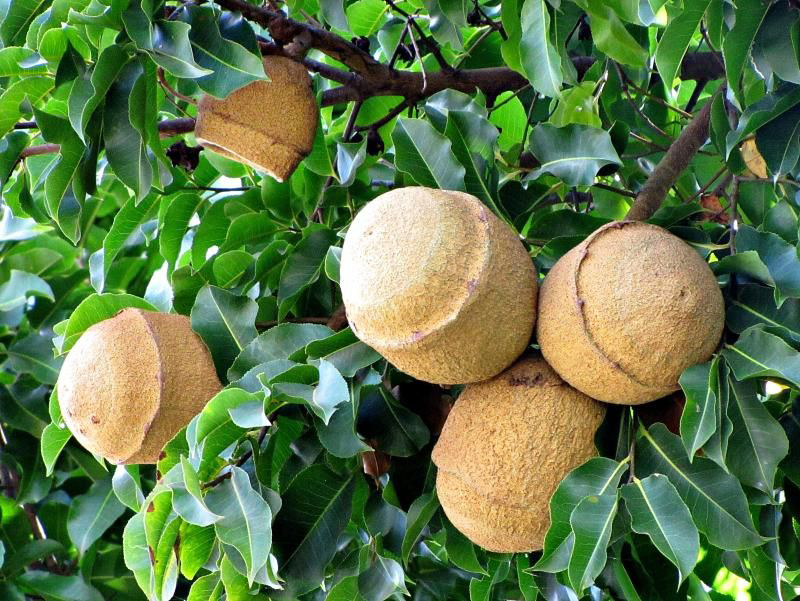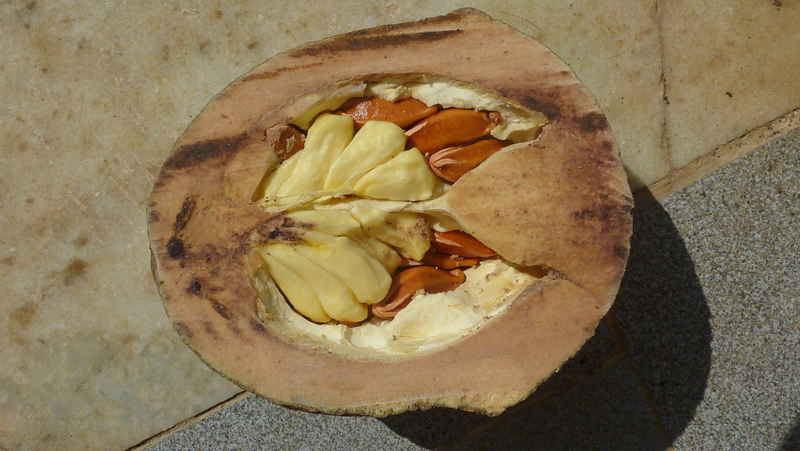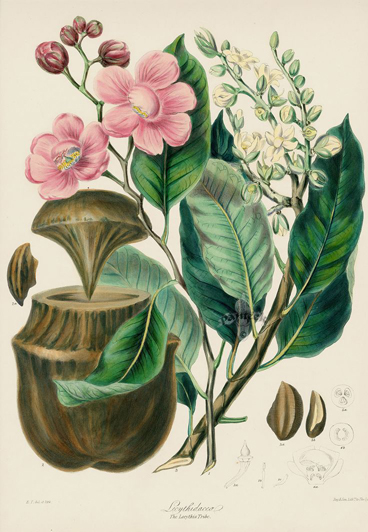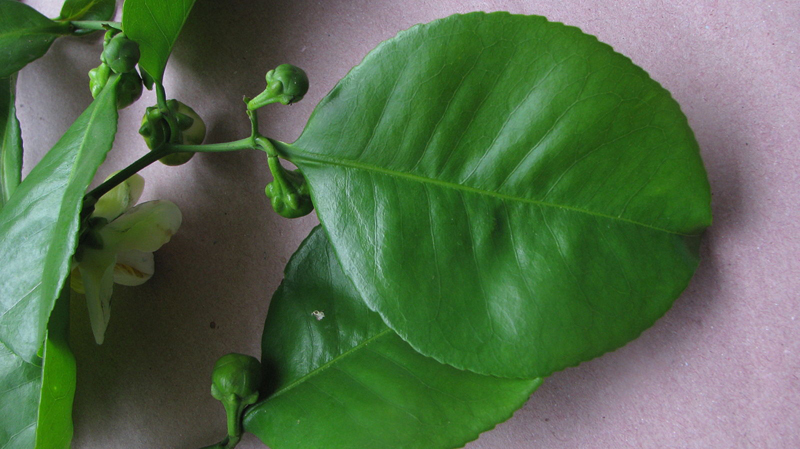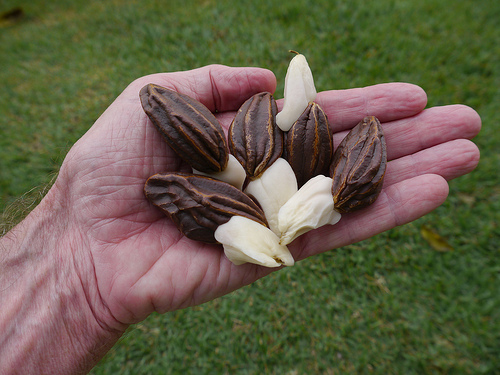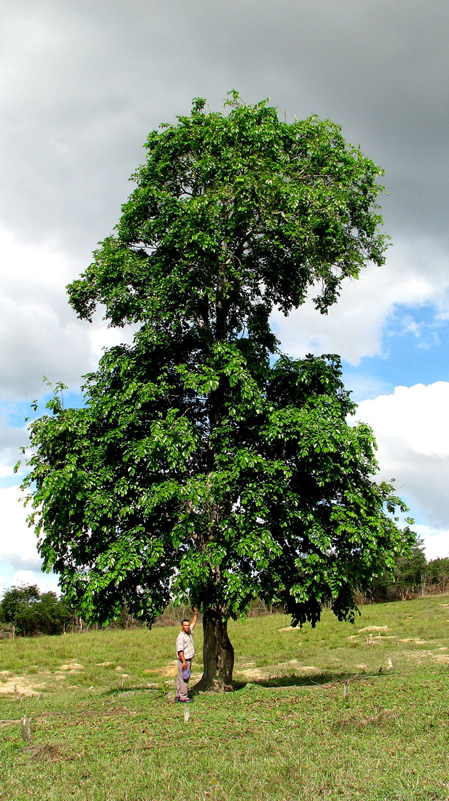| Monkey pot Quick Facts |
| Name: |
Monkey pot |
| Scientific Name: |
Lecythis pisonis |
| Origin |
Native to Amazonia and Brazil |
| Colors |
Woody (Fruit) |
| Shapes |
Globose, oblong or turbinate, Length: 6-15 cm (2.4 to 5.9 inches); Width: 8.5-30 cm (3.3-11.8 inches) (Fruit) |
| Calories |
645.05 Kcal./cup |
| Major nutrients |
Tryptophan (7386.36%)
Copper (3640.00%)
Manganese (3508.26%)
Leucine (3079.00%)
Valine (2935.61%)
|
| Health benefits |
Treat arthritis, Eyes and hair pigmentation, Maintains the level of sugar, Thyroid function, Transports oxygen |
| More facts about Monkey pot |
Lecythis Pisonis is the nut producing tree native to Amazonia and Brazil that belongs to the Lecythidaceae family. Lecythis Pisonis is called Cream Nut, Paradise Nut, Monkey Pot and Sapucaia Nut. Monkey pot is a large, deciduous tree which grows upto 40-50 cm height. The tree has fissured and greyish to dark brown bark. Leaves are pinkish to red, cream or pale green. The lamina is simple, ovate-elliptic, petiole 5 to 12 mm. The tree bears flowers of six rose to purple petals which is obovate and 3-7 cm across. The flowers turn into woody, globose, oblong or turbinate fruit of 6-15 cm (2.4 to 5.9 inches) long and 8.5-30 cm (3.3-11.8 inches) wide. Each fruit possess 10-30 red or brown seeds of elliptical and 5 cm (2.0 inches) long.
Nutritional Value
100 grams of Monkey pot grants 645.05 calories, 5.4 gm of moisture, 20.47 gm of protein, 60.61 gm of total fat, 3.8 gm of ash, 5.67 gm of dietary fiber and 4.42 gm of sugars. The same amount offers 32.5 mg of tryptophan, 32.76 ug of copper, 80.69 ug of manganese, 113.8 mg of leucine, 62 mg of valine, 82.1 mg of lysine, 34.4 mg of threonine, 29.5 mg of isoleucine, 19.3 mg of histidine, 32.65 ug of iron, 40.37 ug of zinc, 60.61 g of total fat, 20.47 g of protein and 5.67 g of dietary fiber.
Health Benefits of Monkey pot
Monkey pot contains enormous amounts of nutrients, minerals and amino acids which provide various health benefits which are described below:
- Treat arthritis
Copper possess an anti-inflammatory properties which helps to reduce the arthritis symptoms. The people wear the copper bracelets to treat this health condition. Copper is an aid for the arthritis. The copper is stored in the water the whole night and drink that water in the morning to strengthen the muscular system. It provides energy and boost metabolism which is required for the regular processes. (1)
- Eyes and hair pigmentation
Copper has an important role in the melanin, dark pigment which provides the color to the hair, skin and eyes. Cuproenzyme is derived from the copper which is required to produce melanin by the melanocytes that is possible in the presence of tyrosinase. The adequate intake of copper prevents the hair from graying and prevents the cells integrity which provides young looking skin. It maintains the eyes color which is required with zinc. (2)
- Maintains the level of sugar
Manganese helps to control the sugar level in the human blood. It prevents the development of the diabetes. Manganese helps to normalize the secretion and synthesis of insulin which helps to control the sugar level in the blood. It prevents unpredictable drops in the blood sugar. (3)
- Thyroid function
Manganese is vital for thyroxine which is considered as an essential hormone in the thyroid gland. The thyroid gland and the hormonal synthesis should function properly so that it helps to treat the appetite, weight loss, efficiency of organ system and metabolism. (4)
- Transports oxygen
Iron helps to transport the oxygen throughout the body from one cell to another so that each body part would be able to function effectively. It is considered as the essential function performed by iron. Each organ in the body needs oxygen to perform its daily functions effectively. (5)
- Treats fatigue
Iron helps to eliminate the chronic or unexplained fatigue which may develop in both women and men. The fatigue is caused due to the deficiency of iron which plays a vital role in the formation of hemoglobin. The addition of iron to the diet helps to make the body fit, healthy and also provides energy externally as well as internally. (6)
- Cognitive health
The research shows that zinc has a powerful impact on the mental functions. If taken with Vitamin b6, it promotes the neurotransmitter functions which are required for the communication with the body. It is available in hippocampus in high amounts that helps to control memory and thought. Extra zinc is required to make the effective brain function for those who have experienced an injury as the body diverts zinc naturally to the other parts to heal. (7)
- Assist in losing weight
Zinc has a vital role in losing weight. Zinc helps to reduce appetite and prevents the overeating. It is associated to the zinc’s manipulation of ghrelin hormone which transfers the body when it wants to eat. (8)
- Immune health
Protein is required to build the immune health. The body prevents itself from the diseases and infections with the assist of antibodies. The antibodies are able to detect the antigens. With the production of antibodies the body responds to antigens and eliminates it. (9)
- Regeneration of tissue and cells
The restoration and renewal of tissues and cells are essential to maintain the health. The body needs fixed supply of amino acids to form the proteins that produces the new tissues and cells such as hair, nails and skin. The cells in the skin, digestive system and blood only last for a couple of weeks which begins to perish after that. This is the time for the replenishment of new cells to replace the reduced ones. The revival of new tissues and cells helps to maintain the good health. (10) (11) (12)
https://www.youtube.com/watch?v=q9hvfEo2Rts
Traditional uses
- In Venezuela, the root decoction is used in hot baths to cure stomach cancer.
- A decoction made from the root is placed in the hot or boiling water which helps to release the compounds.
- The leaves are steeped in water which provides the laxative effect.
- The alcoholic extract from the leaves also prevent Mycobacterium tuberculosis.
- Some people chew a seed that helps to soothe a sore throat.
How to Eat
- The aromatic seeds which have sweet taste are consumed fresh, roasted or boiled.
- In local medicine, an infusion made from the bark and pericarp is used to treat liver complaints.
References:
http://tropical.theferns.info/viewtropical.php?id=Lecythis+pisonis
Comments
comments


